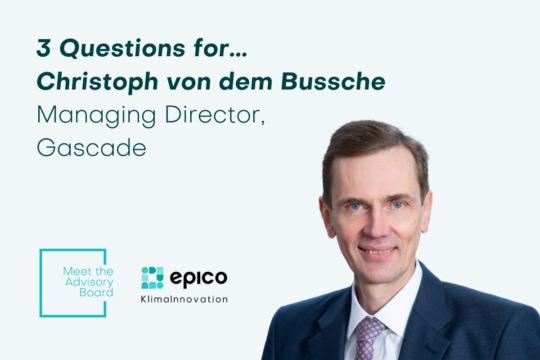EPICO KlimaInnovation is accompanied by a broad-based, independent Advisory Board with high-level members from politics, business, science, and civil society. The Board advises EPICO’s experts on guidelines and the fundamental orientation of the think tank.
With this interview series, we want to introduce the work, expertise, and motivation of each Member of the Advisory Board, as we delve deep into the main questions concerning the future of Europe’s energy transition.
Our first member to be introduced is Christoph von dem Bussche, Managing Director of Gascade, the German gas transmission system operator. Gascade plays a crucial role in ensuring energy security with its gas transport network at the heart of Germany, connecting five European neighbouring countries. At the same time, the company is advancing key hydrogen infrastructure projects, both onshore and offshore.

Christoph, could you share what inspired you to join EPICO as a board member?
The energy transition is a monumental task, with numerous challenges and a variety of solutions. With regard to the decarbonisation of industry, there already exist initial answers, such as the hydrogen strategy and the core hydrogen network. However, there are still many unanswered questions and loose ends, such as how to develop an integrated energy system combining molecules and electrons. In times like these, interdisciplinary and ‘out of the box’ thinking is essential. At the same time, it is crucial to continuously align outcomes and solutions with the reality of our current energy system. EPICO KlimaInnovation provides an important platform for this dialogue, bringing together diverse stakeholders. I am eager to contribute my practical perspective to this discussion.
GASCADE has decades of experience and expertise in gas transport. At the same time, we are tackling the challenge of converting significant parts of our network to hydrogen transport and, where necessary, building new hydrogen pipelines. Our AquaDuctus offshore pipeline, set to become the backbone of a European hydrogen network in the North Sea, has IPCEI status as a key European project and is part of Germany's core hydrogen network. We are confident that we can implement this successfully, even though we are treading new ground and learning a lot along the way.
It is also important to note that we are transforming an active energy supply system "on the go". Until we can fully rely on renewable energy, the natural gas infrastructure must remain stable. In this balancing act, we can make a significant contribution.
In your view, what will be crucial in the next EU legislative period to achieve climate targets and remain competitive?
To kick-start the hydrogen market, we need to build the infrastructure. In Germany, we have made significant progress with the core hydrogen network: the core network application is close to approval. While Germany is leading the way, it is not the only beneficiary. The hydrogen core network includes connections to European neighbours, allowing the entire internal market to benefit and, in the long run, supply our European neighbours with hydrogen. The recently passed EU Gas Market Package lays the legal groundwork for a European hydrogen market. This is crucial. The next step is to bring this framework to life. The EU will need to address the pressing question of where large, affordable quantities of hydrogen will come from in the near future. Pragmatism and technological openness will be essential, especially during the ramp-up phase.
GASCADE aims to launch the construction of an offshore network in the North Sea with the AquaDuctus pipeline. This network will consist of multiple bidirectional pipelines, capable of transporting hydrogen from Norway and the UK to Germany. At the same time, these pipelines will collect hydrogen produced in North Sea wind farms and energy islands. This is a great example of European cooperation potential and how we can build energy sovereignty in the years and decades to come.
What measures are needed to prepare Europe's infrastructure for the EU's hydrogen goals by 2030?
First, we need a European offshore planning framework that coordinates infrastructure projects in the North and Baltic Seas as soon as possible. We need to think about ONE integrated energy system, where cables and pipelines complement each other. If we succeed, we can leverage the benefits of large-scale pipeline infrastructure: a few interconnected pipelines carrying large amounts of hydrogen are more cost-effective and space-efficient, which is particularly important in the North Sea. Additionally, this could help with wind energy transmission. With the new European Network of Network Operators for Hydrogen (ENNOH), we will address this field.
Furthermore, we need to consider the investment conditions for hydrogen infrastructure. The core network has provided a solid framework in Germany. However, this is not yet the case for other necessary hydrogen network expansions within Germany and for cross-border projects. The appropriate frameworks need to be established soon – both in Germany and our neighbouring countries. Only then can the European hydrogen market scale successfully.
At EPICO, we are actively tackling key energy transition challenges. Explore our hydrogen-related research below and stay tuned for more Advisory Board interviews.
Related Content on Hydrogen:
